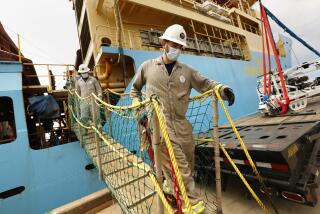Cut Cruise Ship Pollution
- Share via
Large cruise lines have in recent years publicized onboard ecological awareness campaigns such as “Planet Princess,” by Princess Cruises, to “preserve the marine environment,” and “Save the Waves,” by Royal Caribbean, to “protect the ecology of the oceans that support cruising.”
The ships’ new green image, however, belies the continuing threat they pose to the environment. Federal law prohibits cruise ships from releasing untreated sewage less than three miles from shore but permits them to dump up to 30,000 gallons of untreated sewage beyond that point. The law is spottily enforced and often flouted.
The General Accounting Office found that from 1993 to 1998, cruise ships were involved in 87 confirmed cases of illegal dumping off U.S. shores, for which they paid more than $30 million in fines.
AB 906, a bill recently launched by Assemblymen George Nakano (D-Torrance) and John Laird (D-Santa Cruz) in the California Legislature, would tighten state enforcement of cruise ship pollution by declaring that it is in the state’s interest to “prohibit large passenger vessels from releasing waste into national marine sanctuaries in the ... waters of the state.” California is home to four of the 13 sanctuaries, including the Channel Islands National Marine Sanctuary.
The bill’s language sounds tame but it would allow the state to impose fines and other civil penalties on cruise ship operators that release untreated sewage in or near the most ecologically sensitive areas of the coastline. The bill also would encourage the state to petition the Environmental Protection Agency for more authority and funding to police its own shores.
A similar drive in Alaska, spearheaded by former Sen. Frank Murkowski (R-Alaska), enabled that state to crack down on cruise ships that released untreated sewage.
The cruise industry, whose annual trade convention begins this week in Miami, trounced Nakano’s attempt to pass a bill in California three years ago, arguing that waste treatment would cut into the industry’s profits and hurt the substantial cruise business of L.A. and San Diego. Since then, however, the cost of shipboard sewage treatment technologies has plummeted.
The state bill does not solve the larger problem: Washington’s failure to limit the waste discharge beyond three miles offshore. But it would help protect at least some of the seabirds, fish and other natural wonders passengers flock to the cruise lines to see.
More to Read
Sign up for The Wild
We’ll help you find the best places to hike, bike and run, as well as the perfect silent spots for meditation and yoga.
You may occasionally receive promotional content from the Los Angeles Times.






